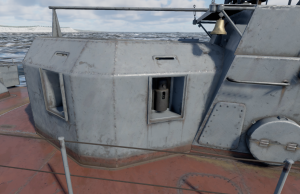Difference between revisions of "BP "Plamya" (30 mm)"
(Added image) (Tag: Visual edit) |
(→History: fixed) (Tag: Visual edit) |
||
| Line 33: | Line 33: | ||
== History == | == History == | ||
| − | '' | + | ''Development of the AGS-17 (Avtomaticheskiy Granatomyot Stankovyi—Automatic Grenade launcher, Mounted) started in the USSR in 1965 by the OKB-16 design bureau (now known as the KB Tochmash), under the leadership of Alexander F. Kornyakov.'' |
| + | |||
| + | ''This lightweight weapon was to provide infantry with close to medium range fire support against enemy personnel and unarmored targets, like trucks, half-tracks, jeeps and sandbag-protected machine-gun nests. The first prototypes of the new weapon entered trials in 1969, with mass production commencing in 1971. The AGS-17 was widely operated and well-liked by Soviet troops in Afghanistan as a ground support weapon or as a vehicle weapon on improvised mounts installed on armoured personnel carriers and trucks.'' | ||
| + | |||
| + | ''A special airborne version of the AGS-17, the AG-17A, was developed for installation on helicopters, including the [[Mi-24V|Mi-24 Hind]] in gun pods and the Mil Mi-8 on door mounts. This weapon had a thick aluminium jacket on the barrel and used a special mount and an electric remotely controlled trigger.'' | ||
| + | |||
| + | ''It is still in use with the Russian army as a direct fire support weapon for infantry troops; it is also installed in several vehicle mounts and turrets along with machine guns, guided rocket launchers and sighting equipment. It is being replaced by the AGS-30 launcher, which fires the same ammunition, but weighs only 16 kg unloaded on the tripod and has an upgraded blowback action.''<ref>https://en.wikipedia.org/wiki/AGS-17</ref> | ||
== Media == | == Media == | ||
Revision as of 05:11, 11 May 2023

Contents
Description
Write an introduction to the article in 2-3 small paragraphs. Briefly tell us about the history of the development and combat using the weaponry and also about its features. Compile a list of air, ground, or naval vehicles that feature this weapon system in the game.
Vehicles equipped with this weapon
General info
Tell us about the tactical and technical characteristics of the cannon or machine gun.
Available ammunition
Describe the shells that are available for the weapon and their features and purpose. If it concerns autocannons or machine guns, write about different ammo belts and what is inside (which types of shells).
Comparison with analogues
Give a comparative description of cannons/machine guns that have firepower equal to this weapon.
Usage in battles
Describe the cannon/machine gun in the game - its distinctive features, tactics of usage against notable opponents. Please don't write a "guide" - do not impose a single point of view, but give the reader food for thought.
Pros and cons
Summarise and briefly evaluate the weaponry in terms of its characteristics and combat effectiveness. Mark pros and cons as a list.
Pros:
Cons:
History
Development of the AGS-17 (Avtomaticheskiy Granatomyot Stankovyi—Automatic Grenade launcher, Mounted) started in the USSR in 1965 by the OKB-16 design bureau (now known as the KB Tochmash), under the leadership of Alexander F. Kornyakov.
This lightweight weapon was to provide infantry with close to medium range fire support against enemy personnel and unarmored targets, like trucks, half-tracks, jeeps and sandbag-protected machine-gun nests. The first prototypes of the new weapon entered trials in 1969, with mass production commencing in 1971. The AGS-17 was widely operated and well-liked by Soviet troops in Afghanistan as a ground support weapon or as a vehicle weapon on improvised mounts installed on armoured personnel carriers and trucks.
A special airborne version of the AGS-17, the AG-17A, was developed for installation on helicopters, including the Mi-24 Hind in gun pods and the Mil Mi-8 on door mounts. This weapon had a thick aluminium jacket on the barrel and used a special mount and an electric remotely controlled trigger.
It is still in use with the Russian army as a direct fire support weapon for infantry troops; it is also installed in several vehicle mounts and turrets along with machine guns, guided rocket launchers and sighting equipment. It is being replaced by the AGS-30 launcher, which fires the same ammunition, but weighs only 16 kg unloaded on the tripod and has an upgraded blowback action.[1]
Media
Excellent additions to the article would be video guides, screenshots from the game, and photos.
See also
Links to the articles on the War Thunder Wiki that you think will be useful for the reader, for example:
- reference to the article about the variant of the cannon/machine gun;
- references to approximate analogues by other nations and research trees.
External links
Paste links to sources and external resources, such as:
- topic on the official game forum;
- other literature.



